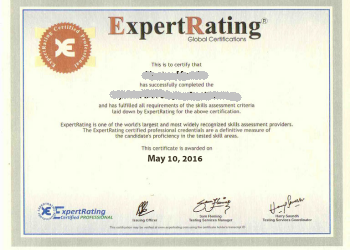Manufacturing Strategy
You'll begin this lesson by exploring the essential area of manufacturing strategy. You'll consider a firm as a system, look at a few key strategic terms, and talk about market analysis. Then, you'll review the background of manufacturing strategy and discuss its foundation. Finally, you'll finish up by identifying what's involved in developing and implementing a manufacturing strategy and investigating strategic choices.
Demand Forecasting
If there's one area that's caused problems for manufacturers over the years, it's forecasting. In this lesson, you'll start with the characteristics of forecasting and see how you can use a qualitative, quantitative, or a hybrid approach that follows certain types of rules. Then, the lesson will discuss the requirements for developing and implementing a sound forecast, exploring how to forecast new products. You'll finish by examining various ways to control your forecasts.
Planning
Now that you have a good understanding of manufacturing strategy and demand forecasting, you need to perform manufacturing planning. Planning is a pervasive activity; it gives rise to just about everything. This lesson will talk about how planning and control work together, discuss the nature of manufacturing planning, and explore a few planning techniques, including Gantt charts and the network diagram scheduling method.
Purchasing
Purchasing employees contribute greatly to the success of manufacturing organizations. Every dollar saved by purchasing equals a dollar of profit. It's too bad that many firms don't realize the value of purchasing. They view it as a clerical function—simply a matter of sending purchase orders to suppliers. In this lesson, you'll take a whirlwind tour through the world of purchasing. The lesson will briefly discuss the Institute for Supply Management (ISM), look at the way for purchasing to be proactive instead of reactive, and explore the seven steps of the purchasing cycle.
Lean Manufacturing
This lesson will discuss lean manufacturing. This topic has an interesting history; it originated from Henry Ford's operations in the United States in the early 1900s. Japanese industry popularized it in the 1970s, and it was later introduced in the Western world as just-in-time (JIT) during the early 1980s. By the early 1990s, the terms lean production or lean manufacturing began to appear. Few firms use the JIT label these days. So, "lean manufacturing" it is. The lesson will discuss its benefits and the various elements of it, starting with good housekeeping (5S) and concluding with quality at the source. After that, it will close with a discussion on how to implement lean manufacturing.
Production and Inventory Control
Someone once called production and inventory control (P & IC) "organized foresight plus corrective hindsight." It begins with receipt of a sales order and ends with delivery to the customer. It requires knowledge of what should happen and what did happen. For many years, P & IC personnel have played a valuable role in completing manufacturing schedules and satisfying customers. So, in this lesson, you'll examine the primary duties of P & IC: master production scheduling, shop floor scheduling, production activity control, material requirements planning, and inventory management.
Capacity Planning
Of all the concepts that have been discussed so far, none is more important than capacity. After all, if you don't have sufficient capacity, you won't manufacture much! This lesson will start out with an overview of capacity and define a few terms, including design and effective capacity, and actual output. You'll explore how rough-cut capacity planning and capacity requirements planning (CRP) help measure available capacity. Then, you'll move on and examine a few capacity-use strategies as they relate to customer demand, technology, and other variables. You'll finish up by discussing three essential tools to help with capacity management: break-even analysis, decision trees, and decision theory.
Manufacturing Engineering
This lesson is the start of a three-part discussion on how engineering and manufacturing work together. Manufacturing engineering brings a certain level of sophistication to a production environment. You'll take a tour through the manufacturing engineering function, starting with its history, its relationship with other departments, and its major functions. Then, you'll explore the essential activity of process planning and review the various elements. You'll also examine key manufacturing engineering focus areas including computer-aided process planning (CAPP), value analysis, design for manufacturability (DFM), concurrent engineering (CE), rapid prototyping, and expert systems.
Industrial Engineering
Since you spent the entire last lesson discussing manufacturing engineering, it's only fair that you give equal time to the related field of industrial engineering (IE). IE joins people, machines, materials, and information to bring efficiency and effectiveness to a production operation. IE views human beings as a vital component of a system. You'll start out with a brief overview and history of industrial engineering. Next, the lesson will discuss work measurement while you explore ways to develop work standards. You'll determine how earned value performance measurement helps you control costs and performance. Then, you'll wrap things up by looking at flowcharts and examining their benefits.
Quality Engineering
In this lesson, you'll finish up the trilogy on engineering by tackling quality engineering. Quality engineers are responsible for assuring a high performing, quality system. To achieve this, they need a good understanding of quality costs, Six Sigma, and statistical process control (SPC), including its main components, which are run charts, control charts, and process capability. This lesson will discuss each of these topics.
Logistics
Manufacturing companies must know the ins and outs of physical transportation (otherwise known as traffic or logistics). Since your company either directly or indirectly pays for transportation, you need a good command of the basics. You'll start out this lesson with an overview of the logistics system and briefly review each element. Then, you'll move on to discuss warehousing and examine many transportation concepts such as tracing, carrier modes and types, and the receiving process.
Productivity
The topic for this last lesson is productivity. Quality and productivity form a potent one-two punch for manufacturers. When both are present to the right degree, your chances for success are high. Like quality, the journey for productivity improvement is never-ending. You'll begin with an overview of productivity, then look at the basic productivity calculation, learn about historical global productivity trends, and examine the experience curve. Next, you'll look at measurements of productivity and review how quality and human effort affect productivity. Finally, you'll explore the various productivity factors and discuss the elements of a productivity improvement system.


